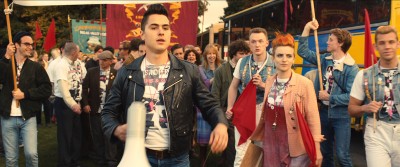The footage of the 1984 U.K. miners’ strike shown in the establishing minutes of “Pride” gives just the right sense of realism and an even better sense of urgency. “I’m not here to be a softie,” U.K. Prime Minister Margaret Thatcher drones from a tube TV in the lonely corner of Mark Ashton’s (Ben Schnetzer) London flat. It’s pretty clear at this point that nobody is.

A little context helps: In 1984, the National Coal Board, which oversaw the United Kingdom’s nationalized coal mining industry, announced the Thatcher government’s plan to close 20 mines across the country in order to reduce costly subsidies – at the expense of 20,000 jobs. With communities built on these coal pits facing closure, workers began to step off the job. Not a week later, the National Union of Mineworkers announced a nationwide strike, putting the miners on front pages everywhere.
All of this has already unfolded when Mark wakes up on the morning of the Gay Pride March in London. An idea hits him: A stack of buckets in tow, Mark distributes them among his mates and calls out from the parade for donations for the mining towns. With that, the “Lesbians and Gays Support the Miners” campaign begins to take shape. What follows is a true story worth hearing and hearing again, one that may never be told better than it is in “Pride.”
From the second the hand-cam digs your nose into the action, the immersion is unbreakable. Our proxy is Bromley (George MacKay), a closeted gay young man and one of the few characters invented for the film who gets roped into the campaign after sneaking away from his white-bread parents to scope out the London Pride March. (Joe is his real name, but it never sticks.)
Like the rest of the LGSM gang, Bromley – wide-eyed, naïve, eager to help the cause – first comes across as too archetypal for his own good. Mark is the de facto leader, headstrong and wholehearted, crowned with a pompadour. At his side are the deadpan-witty and bespectacled Mike (Joseph Gilgun) and the not-having-any-of-your-crap Steph (Faye Marsay). In another universe, they could have their own “Goonies”-style adventure. Instead, remarkably, their familiarity only makes them more relatable. Dig for dig, smart-alecky retort for smart-alecky retort, you’re one of the gang. Like them, your heart’s in it.
Which isn’t always easy. As anyone can imagine, not everyone in the Welsh pit town is eager to accept help from a pack of Hell-bound perverts, nor is everyone in the London LGBT community willing to shell out for some soot-stained bigots out in the boonies.
While a sensitive amount of “worlds-colliding” humor goes into writing the groups’ initial interactions, the sinister undercurrent is never far away; hate and hurt run deeper than the mines. It takes a certain kind of “all-in-this-together” understanding on both sides to do any good. After all, Mark explains, the government’s “giving these poor sods the shit we usually get.” He and the others know too well how life on the margin feels and see no point in backing down.
Back on the town committee, Dai (Paddy Considine) puts it another way: Why support some rights and not others? The film deftly questions the sense in hating a fellow human simply for the way that person looks, lives or loves. The town’s flag, the most potent symbol in “Pride,” bears two hands clasped in a shake. “I support you,” Dai explains. “You support me.” Who you are doesn’t change that.
It’s watching that message take root that makes “Pride” so excellent, and credit is due all over. For one, the ensemble – with special attention to Schnetzer’s Mark and Andrew Scott’s Gethin, another member of the LGSM – is in absolute prime form. Director Matthew Warchus pours his years of theatre experience into the film’s almost scientifically precise mise-en-scène. Though only his first cinematic writing credit, Stephen Beresford packs enough smart dialogue and eye-welling narrative into the screenplay to suit 10 more movies. Best of all, most of it really happened.
That last part can’t be discounted. As a double-barreled underdog story based on real events, “Pride” has potential to be very important to such divided times. Or maybe, it sometimes hints, they aren’t as divided as we might think. One character, shunned by his family for his sexuality and unwilling to return to Wales with the others, breaks down into tears after hearing “Nadolig Llawen” – Merry Christmas in Welsh – offered so earnestly to him by one of the townspeople.
“It’s such a terrible life. It’s lonely,” one of the LGSM is warned. His expression in response says it all: Nothing could be less true. By that point, the boundaries have long since fallen away. Pints have been shared, and the lesson has been learned. Reach out to those reaching out. Support and be supported. There is power in a union.
“Pride” was given a limited U.S. release on Sept. 26. The film is currently playing at the Coolidge Corner Theatre in Brookline and the Kendall Square Cinema in Cambridge.
















































































































